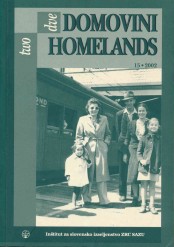Multiculturalism, International Migrations and Inherited Group Identifications: Ethnicity, Race, Sex
Abstract
International migrations are becoming one of the key problems in contemporary integration processes of the European Union. Member States of the EU have different migration policies and different relations towards emigrants and their descendants. Those differences are rooted in the time of liberal policy of the sixties, and they strengthened in the seventies and eighties, in the period after the oil crisis. A good example is Sweden with its multicultural policy. Differences are noticeable above all in the relation towards the inherited group identifications (ethnicity, race, sex). They exhibit on the level of everyday life, in political culture, and in politics in a narrower meaning of the word. The latter is as well connected with the conditions of naturalisation. Sex, race and ethnicity can “operate” separately, but in numerous contexts they cover over each other, which results in intensification of discrimination of the majority environment in relation towards the carrier of “selected cultural/social-political” symbols for such distinguishing among people. Hence it follows, that women – immigrants, members of unwanted races who within that come from the most unwanted ethnic environments – are exposed to the worst discrimination.
Downloads
References
BERGER, P., T. LUCKM ANN (1988): Družbena konstrukcija realnosti. Cankarjeva založba, Ljubljana.
CASTLES,S., M. J. M ILLER (1993): The Age of Migration. Mcmillan, London.
CAWS, P. (1994): Idnetity: Cultural, Transcultural, and Multicultural. V: D. T. Goldberg (ur.), M ulticulturalism. Blackwell, Cambridge, str. 371-387.
GATES, H. L. (1994): Goodbye Columbus? Notes on the Culture of Criticism. V: D. T. Goldberg (ur.), M ulticulturalism. Blackwell, Cambridge, str. 203-217.
GIROUX, H. E. (1994): Insurgent M ulticulturalism and the Promise of Pedagogy. V: D. T. Goldberg (ur.), M ulticulturalism. Blackwell, Cambridge, str. 325-343
GOLDBERG, D. T. (1994): M ulticultural C onditions. V: D. T. G oldberg (ur.), Multiculturalism. Blackwell, Cambridge, str. 1-44.
GORDON, M. (1964): Assimilation in American Life. Oxford Univ. Press, New York.
HABERMAS, J. ( 1991): Državljanstvo i nacionalni identitet, Razmišljanja o evropskoj budučnosti. Filozofska istraživanja Sv. 1, Zagreb, str. 137-155.
JUŽNIČ, S. (1993): Identiteta. Knjižna zbirka TiP, Ljubljana.
KLINAR, P. (1976): M ednarodne migracije. Obzorja, Maribor.
LUKŠIČ-HACIN, M. (1999): Multikulturalizem in migracije. Založba ZRC, Ljubljana.
McLa r e n , p. (1994): W hite Terror and Oppositional Agency: Towards a Critical Multiculturalism. V: D. T. Goldberg (ur.), Multiculturalism. Blackwell, Cambridge, str. 45-74.
M ORGAN, L. H. (1981): Drevno društvo: istraživanje čovekovog razvoja od divjaštva i varvarstva do civilizacije. Prosveta, Beograd.
RIZM AN, R. (1995): Nacionalizem: Pro et Contra. V: Vesela znanost o okolju, št. 1, Ljubljana, str. 193.
ROCKEFELLER, S. C. (1992): Com m ent. V: Ch. Taylor, M ulticulturalism and The Politics of Recognition. Princeton Univ, Press, Princeton, str. 87.
SMITH, A. D. (1986): The Ethnic Origins of Nations. Basil Blackwell, Oxford/New York.
STAM, R„ E. SHOHAT (1994): Contested Histories: Eurocentrism , M ulticulturalism, and the Media. V: D. T. Goldberg (ur.), M ulticulturalism. Blackwell, Cambridge, str. 296-324.
TAYLOR, CH. (1992): M ulticulturalism and The Politics of Recognition. Princeton Univ, Press, Princeton.
VERDERY, K. (1988): Are regional stereotypes ethnic? V: Razprave in gradivo. Inštitut za narodnostna vprašanja, Ljubljana, str. 169-173.
Downloads
Published
How to Cite
Issue
Section
License

This work is licensed under a Creative Commons Attribution-NonCommercial-NoDerivatives 4.0 International License.
Authors guarantee that the work is their own original creation and does not infringe any statutory or common-law copyright or any proprietary right of any third party. In case of claims by third parties, authors commit their self to defend the interests of the publisher, and shall cover any potential costs.
More in: Submission chapter





